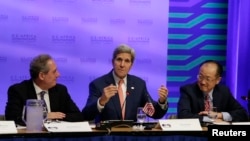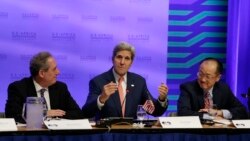The leaders of some 50 African nations are gathering here in Washington to meet with U.S. government, business and civil society leaders to discuss trade and investment, peace and regional stability, and governing for the next generation.
The three-day summit -- August 4, 5 and 6 – will do more than that, however. It will also underscore our nation’s commitment to Africa’s people, democracy and governance, and highlight our commitment to addressing issues that affect us all.
Increased engagement with the nations of Africa is a high priority of U.S. foreign policy. President Barack Obama has emphasized how important this relationship is, beginning with his traveling to Ghana soon after taking office in 2009.
Last year, presidential trips to South Africa, Tanzania and Senegal saw the announcement of the Power Africa program, a U.S. initiative to help double access to electrical power in sub-Saharan Africa and spur greater economic development there. The 2014 U.S.-Africa Leaders Summit, the first time that the vast majority of the Continent’s leaders have gathered here, is another step in our efforts to demonstrate U.S. commitment to the Continent.
Discussions will center on how to make progress in key areas that Africans themselves see as critical to the future of the Continent, expanding trade and investment ties, promoting inclusive sustainable development, expanding cooperation on peace and security, and ensuring a better future for Africa’s next generation. They will also focus on civil society, women, health, wildlife trafficking, and food security in a changing climate, as well as achieving a successful Post-2015 Development Agenda during official U.S.-government sponsored “Signature Events.”
A related U.S.-Africa Business Forum is expected to result in hundreds of millions of dollars’ worth of agreements between U.S. and African firms. In addition, these events follow a week of meetings between 500 young African leaders and U.S. government, civil society and business leaders in which social policy, good governance, business and technology were discussed as part of President Obama’s Young African Leaders Initiative.
Forging stronger personal connections among leaders advances America’s and Africa’s many, many shared priorities. It also fosters further future engagement, and deepens the partnership between the American and African peoples as we both pursue a better future for us all.






